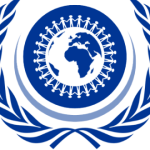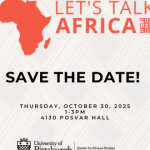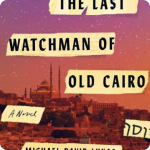Upcoming Events

- 3:00 pm
- 4th Floor Posvar Hall
Join us in Posvar Hall for a one-of-a-kind block party, hosted by the centers on the fourth floor! Connect and learn about student clubs, organizations and discover new spaces to hang out between classes to support your academic journey, all with live music and free food! This interactive event offers the perfect opportunity to explore how our Centers can elevate your college experience and boost your success. Come and go, before, after or between classes during this three-hour block of fun!

- 8:00 am to 4:00 pm
- William Pitt Union and O'Hara Student Center, Pitt-Oakland Campus Model United Nations high school simulation

- Dominique Brown, Teaching Assistant Professor at the Gender, Sexuality and Women's Studies Program
- 1:00 pm to 3:00 pm
- 4130 Posvar Hall
Join us for Let's Talk Africa featuring Dominique Brown, Teaching Assistant Professor at our Gender, Sexuality and Women's Studies Program. She'll share her transformative Fulbright Hays experience in Senegal—from building research partnerships to diving deep into West African language, history, and culture.

- Audrey Maize
- 8:00 pm to 9:00 pm
- Global Hub

- Molly McSweeney
- 3:00 pm to 4:00 pm
- Global Hub
Attention: Undergraduate students! Are you looking to gain experience that will help prepare you for a globally-connected job market? Stop by Drop-In Hours to learn more about getting the Global Distinction added to your academic transcript, receiving special recognition at graduation, and standing out to prospective employers!

- 6:00 pm to 7:30 pm
- via Zoom
This professional development workshop series is designed for K-12 educators seeking to deepen their understanding of global issues through literature. This year, we will explore the theme of “The U.S. in the World.” Through global and regional perspectives, we will discuss narratives of a “Global United States,” where the U.S. role in the world and its relationship with other countries and regions is informed by transnational narratives and dialogues shaped by global trends such as migration, environmental issues, human rights, and human conditions. By exploring compelling stories from diverse cultural perspectives, educators will gain insights into the complexities of this theme, its impact on individuals and communities, and how to engage students in meaningful discussions around these topics. Each session features a carefully selected book, paired with historically contextualized presentations, interactive discussions, teaching strategies, and cross-disciplinary activities to inspire classroom implementation. The workshop for March 19, 2026 will focus on the book, "The Last Watchman of Old Cairo," by by Michael David Lukas. Sessions this year will take place virtually on Thursday evenings from 6:00-7:30 p.m. (ET). Three Act 48 credit hours (for PA educators) and a copy of the book are provided for each session. For more information and to register, please go to: https://www.ucis.pitt.edu/global/GILS .
